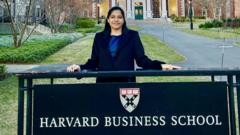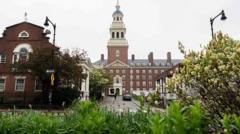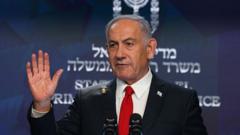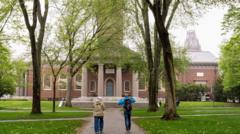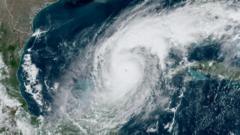A judge has issued a temporary restraining order preventing the Trump administration from executing its decision to revoke Harvard University's access to enroll foreign students. This ruling follows a lawsuit initiated by Harvard, which argues that the government’s actions represent a breach of legal and free speech rights. The administration contends that Harvard's failure to address issues like antisemitism justifies their measures, which the university vehemently denies.
Trump Administration's Harvard Student Enrollment Plan Halted by Judge
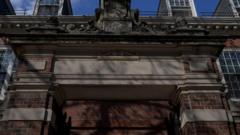
Trump Administration's Harvard Student Enrollment Plan Halted by Judge
A temporary ruling blocks the Trump administration's efforts to prevent Harvard from enrolling international students amid ongoing legal and political disputes.
US District Judge Allison Burroughs issued her ruling on Friday, putting a stop to the Department of Homeland Security's recent move that aimed to exclude Harvard from the Student and Exchange Visitor Program (SEVP), which regulates foreign student enrollment. The next court appearance in this escalating feud between the university and the White House has been set for May 29 in Boston.
In its lawsuit, Harvard claims that the government’s actions could remove a significant portion of its student body, asserting that international students play a vital role in the institution's mission. Harvard’s President Alan Garber condemned the government's move as "unlawful and unwarranted" and criticized it as retaliation for Harvard's commitment to academic independence. Following the judge's ruling, White House deputy press secretary Abigail Jackson dismissed the decision, suggesting the judiciary has no authority to challenge the administration's immigration and national security policies.
Friday saw a subdued atmosphere on Harvard's campus as preparations for graduation unfold amidst uncertainty. For some graduating foreign students, feelings of anxiety and doubt lingered as they contemplated their futures in the U.S. Graduating senior Cormac Savage from Northern Ireland noted the confusion surrounding his post-graduation work prospects.
Currently, over 6,800 international students, comprising more than 27% of Harvard's enrollment this year, face an uncertain future. They include diverse students from China, India, the UK, and other countries. The financial implications of losing international students could be significant for Harvard, impacting its ability to provide financial aid to American students, as these foreign enrollees often pay full tuition fees.
Isaac Bangura, a public administration student from Sierra Leone, expressed concern for his family's future amid fears of deportation. Meanwhile, President Trump has asserted that Harvard must make changes to its policies or face further repercussions. The administration has previously sought to disrupt funding and has alleged that elite institutions do not adequately address conservative viewpoints.
Experts suggest Harvard is well-equipped to defend itself in court, although potential outcomes at the Supreme Court remain unpredictable. International students have voiced their worries, fearing potential transfer to other universities or an abrupt return to their home countries. The situation has developed into a significant dispute centered on immigration, education policy, and free speech, with many students caught in the middle.
In its lawsuit, Harvard claims that the government’s actions could remove a significant portion of its student body, asserting that international students play a vital role in the institution's mission. Harvard’s President Alan Garber condemned the government's move as "unlawful and unwarranted" and criticized it as retaliation for Harvard's commitment to academic independence. Following the judge's ruling, White House deputy press secretary Abigail Jackson dismissed the decision, suggesting the judiciary has no authority to challenge the administration's immigration and national security policies.
Friday saw a subdued atmosphere on Harvard's campus as preparations for graduation unfold amidst uncertainty. For some graduating foreign students, feelings of anxiety and doubt lingered as they contemplated their futures in the U.S. Graduating senior Cormac Savage from Northern Ireland noted the confusion surrounding his post-graduation work prospects.
Currently, over 6,800 international students, comprising more than 27% of Harvard's enrollment this year, face an uncertain future. They include diverse students from China, India, the UK, and other countries. The financial implications of losing international students could be significant for Harvard, impacting its ability to provide financial aid to American students, as these foreign enrollees often pay full tuition fees.
Isaac Bangura, a public administration student from Sierra Leone, expressed concern for his family's future amid fears of deportation. Meanwhile, President Trump has asserted that Harvard must make changes to its policies or face further repercussions. The administration has previously sought to disrupt funding and has alleged that elite institutions do not adequately address conservative viewpoints.
Experts suggest Harvard is well-equipped to defend itself in court, although potential outcomes at the Supreme Court remain unpredictable. International students have voiced their worries, fearing potential transfer to other universities or an abrupt return to their home countries. The situation has developed into a significant dispute centered on immigration, education policy, and free speech, with many students caught in the middle.


